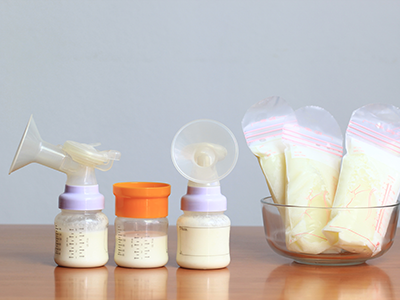Many moms feel anxiety about returning to work after having a baby. Juggling the demands of a job with the needs of a new baby is not an easy task. And, if you have decided to continue breastfeeding after returning to work, you may be wondering how you will be able to manage it all. Judith Campbell, RNC, IBCLC, lactation consultant in the Neonatal Intensive Care Unit at Children’s National Hospital has five tips for making pumping at work easier.
- Have a photo of your baby, or a video on your phone, to use at work when you pump. Stimulating your senses with photos and videos of your baby can help with milk letdown. A few deep breaths, a short meditation or a soothing song can help too!
- Bring plenty of milk storage containers and essential spare parts for your pump. You never know when you’ll forget something while rushing out the door!
- Know your rights and communicate with your supervisor about any needs. Talk to your supervisor about where you will pump and store your milk. Most employers in the United States are required to provide you with a private place to pump and a reasonable break time for pumping. Many states also have additional protective laws.
- Have a storage solution, for example an insulated cooler or the office refrigerator. Breastmilk is a food, so it is safe to keep in a refrigerator alongside other foods. If you are using an employee refrigerator, be sure to label milk with your name and the date you expressed it and try to keep the milk in the back of the refrigerator where the temperature is the most constant and coldest. If you do not have access to a refrigerator, you can store and carry freshly expressed milk in an insulated cooler bag with frozen ice packs for up to 24 hours. Once you get home use the milk right away, store it in the refrigerator or freeze it.
- Examine options for pumps to find the one that works best for you. With so many types of pumps available, it’s important to find one you feel comfortable using. At least two weeks before you return to work, start practicing with your pump so you’re not watching online tutorials on your first day back! Most insurance companies will cover the cost of your pump so talk to your insurance company about their policy.
 https://riseandshine.childrensnational.org/wp-content/uploads/2023/08/breastpump-and-bags-feature.png
300
400
Rise and Shine
https://riseandshine.childrensnational.org/wp-content/uploads/2017/11/childrens_riseandshine_logo.jpg
Rise and Shine2023-08-09 12:05:292024-12-30 12:28:23Five tips for breastfeeding and returning to work
https://riseandshine.childrensnational.org/wp-content/uploads/2023/08/breastpump-and-bags-feature.png
300
400
Rise and Shine
https://riseandshine.childrensnational.org/wp-content/uploads/2017/11/childrens_riseandshine_logo.jpg
Rise and Shine2023-08-09 12:05:292024-12-30 12:28:23Five tips for breastfeeding and returning to work












Leave a Comment
Want to join the discussion?Feel free to contribute!